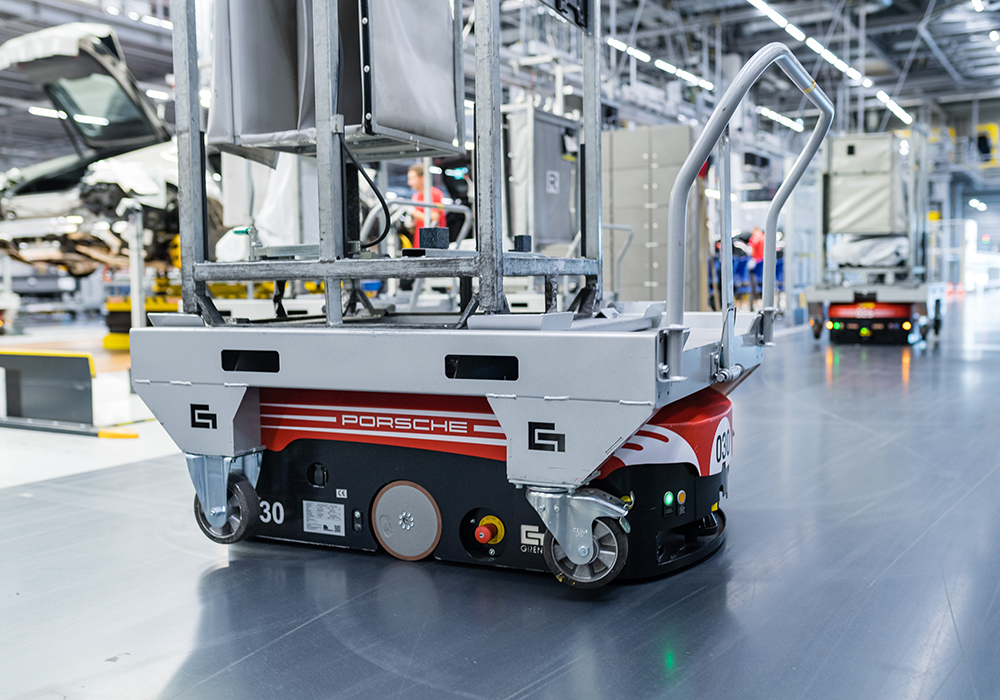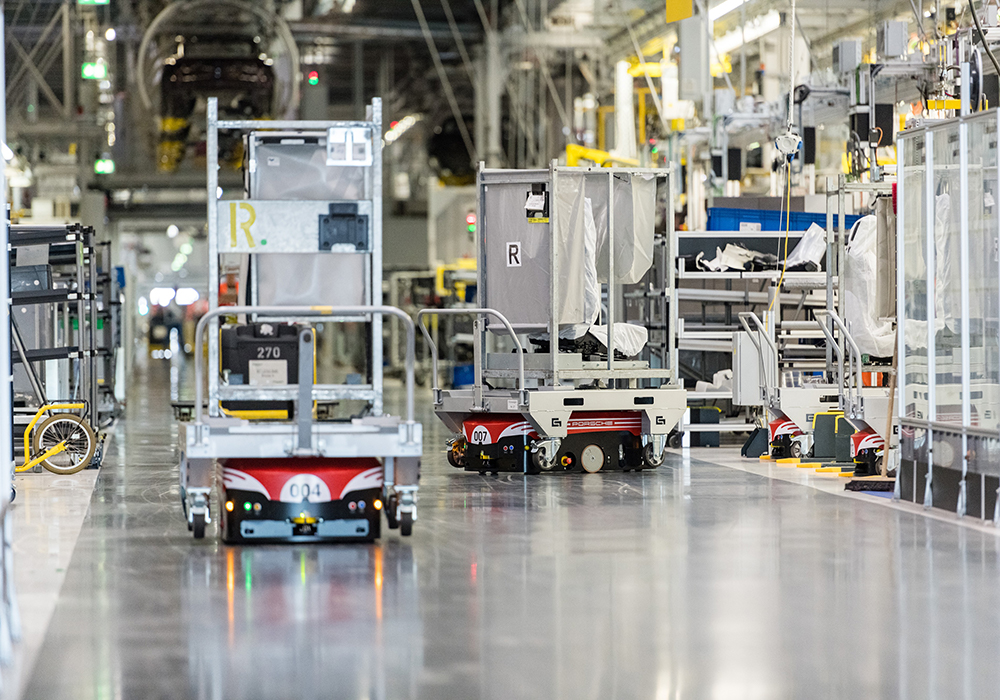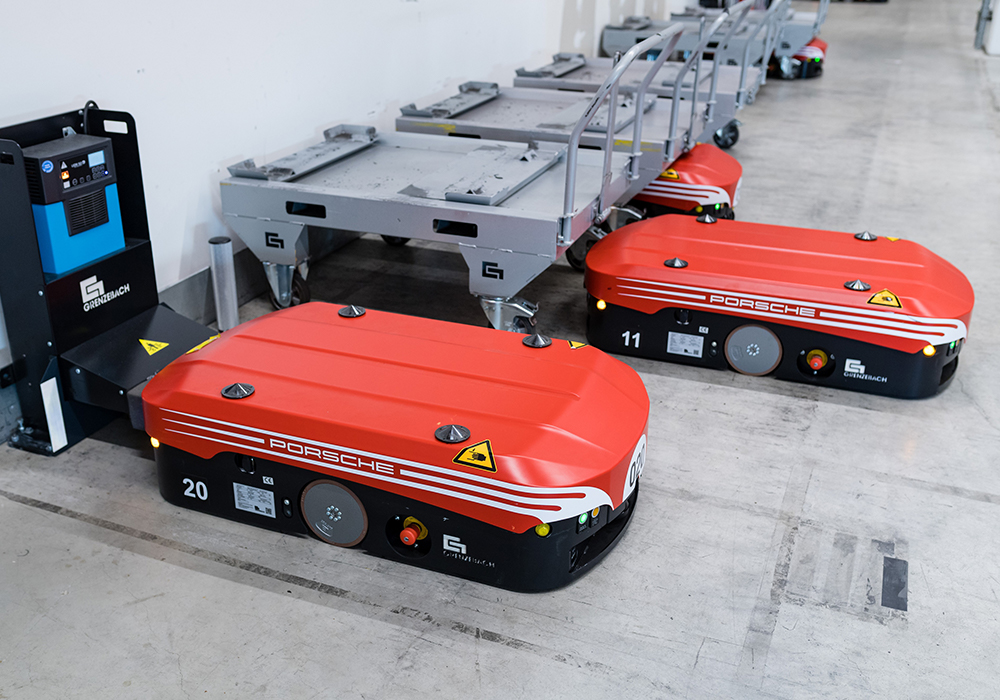Grenzebach contributes to award-winning intralogistics at Porsche in Leipzig
In February of 2020, Porsche‘s production plant in Leipzig was awarded a logistics award by the German Association of the Automotive Industry.
A Grenzebach automated guided vehicle solution for automated goods transport is part of the award-winning logistics concept.
In the complex sequential production for the Macan and Panamera models, 30 Grenzebach L1200S AGVs reliably supply seats and back seats in the final assembly stage.
The Grenzebach L1200S are responsible for the transport of seats and rear benches from the receiving point to the production line.
“An extremely complex matter,” says Frank Röske, head of logistics planning at Porsche in Leipzig, who was leading the project.

Nowadays, no two cars are the same, the models are manufactured according to customer’s individual specifications.
“Therefore, the correct seats and rear benches must be provided at the right time and in the right place on the assembly line,” says Röske. “More precisely, for driver and passenger side respectively on the corresponding side of the line.”
The 30 L1200S automated guided vehicles master this task in up to three shifts. Containers with the components to be transported are delivered by the supplier directly to the receiving point.
“One of the challenges was to fit our load carriers into the supplier’s automation concept,” says Robert Luxenhofer, sales director at Grenzebach. “We adapted our carriers so that the supplier’s containers can be transported by the L1200S without modification.”
Once the components are picked up from the receiving point, they are delivered to the production line just-in-sequence.

Three stations are supplied sequentially and equipped accordingly. This ensures that there is always one seat ready while two additional seats are in a waiting position. Assembly workers take on the components using special handling equipment.
“The handling equipment has very little room to maneuver, which is why the product carriers have to be positioned very precisely. The Grenzebach solution provides us with the required positioning accuracy,” explains Röske.
After the components have been delivered, the empty product carriers are automatically transported away. A safety mechanism controls the access of the AGVs to the line.
This allows for automated guided vehicles and manual handling equipment to be used safely at the same time.
Prior to the automation, the entire transport was carried out manually using tugger trains. With the automated process, Porsche benefits not only from reliable delivery, but also from greater flexibility.
Tugger trains transported up to four seats at one time. Automated guided vehicles transport parts individually allowing transport orders to be adapted flexibly and prioritized in the event of sequence changes.
This equalizes neuralgic points along the line and ensures less cross-traffic with tugger trains.

The L1200S automated guided vehicles are coordinated by the Grenzebach Fleet Manager. The fleet manager software not only translates the sequence list into driving orders, but also optimizes the allocation of trips to the individual vehicles.
This ensures the shortest possible reaction times and the best possible use of the vehicles’ battery charges. The AGVs use lithium-ion battery technology.
“Thanks to this modern energy concept, we have been able to significantly reduce the number of vehicles required for the transport task. Our vehicles only need 30 minutes charging time to get back to 80 per cent charging capacity,” says Luxenhofer.
Porsche developed the award-winning logistics concept in-house. The results of the internal project was the basis for the collaboration with Grenzebach.
“During the course of the project, we were able to identify more optimization potential that we took into account during implementation,” says Röske.
“Grenzebach and Porsche worked hand in hand. The promise of an integrated logistics solution including hardware, software, consulting and service was brilliantly implemented.”
During the project, an additional monitoring system was developed as well to compare the components provided with the requirements on the production line.
“This software, developed by Porsche, checks whether we are actually transporting the required seat during the loading of our carriers. This ensures that vehicles only make their way to the assembly line if they have the correct load,” says Luxenhofer.
Grenzebach and Porsche now intend to build on the success of the joint project: Following the successful implementation in the “seats” project, extensions of the automated goods transport system for other areas of the production are currently being discussed.

